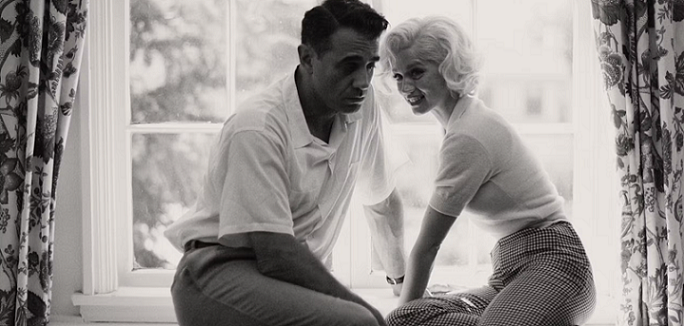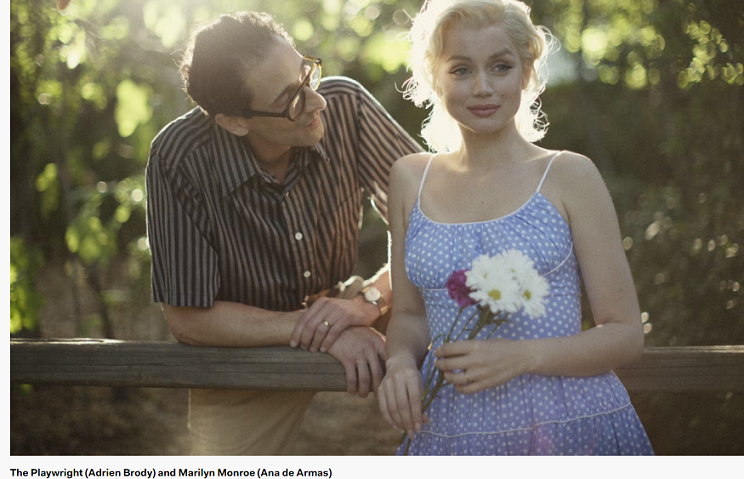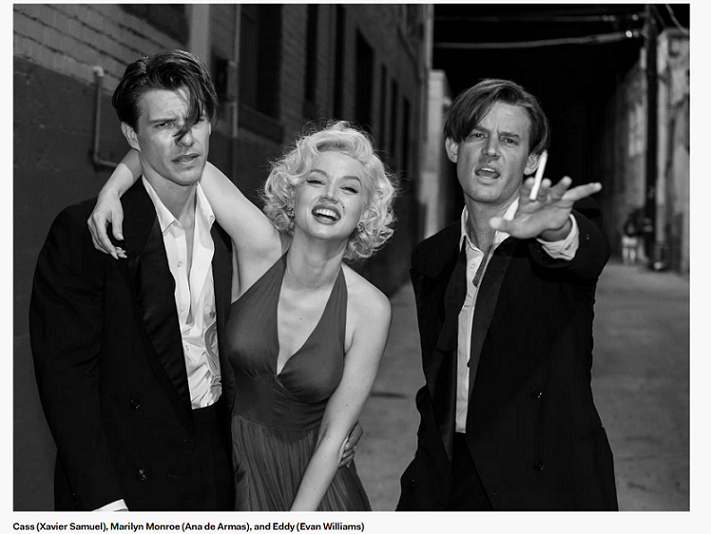
Director Andrew Dominik’s Blonde explores the starlet’s complicated relationships.
Inside the booth of a New York restaurant, Marilyn Monroe sits opposite a revered playwright — they’re sharing a meal after her audition for his latest work. He feels he’s humoring her. How could this vacuous screen siren possibly have anything substantive to offer to his production? Then, with one stunningly insightful observation, she reorients his perception of her entirely. Before long, they’ve fallen in love.
It’s an intimate scene that leaps off the screen in Andrew Dominik’s new film Blonde, which offers a searing and singular portrait of the interior life of screen icon Marilyn Monroe, played by Ana de Armas (Knives Out). “He’s got to turn on a dime once he realizes that this person he’s having dinner with is not the bubble-headed actress he thought she was,” explains filmmaker Dominik. “She actually knows more about what happened in an event in his life than he does. He’s got to put down this self-absorbed writer guy who’s really sensitive to criticism and on the attack. He’s got to drop that and plug into 30 years of grief and then look at her like, Where have you been? Where has this person who understands me better than anyone I’ve ever met come from?”
The exchange dazzles not only because of the electrifying performances from star de Armas and Oscar-winner Adrien Brody, who portrays The Playwright, but also because it’s one of the few fleeting moments of uplift and connection in Dominik’s haunting, elliptical tragedy. Based on author Joyce Carol Oates’s best-selling fictional novel Blonde, the film unflinchingly depicts the violence that was visited on Monroe, from her earliest days in Los Angeles as Norma Jeane Baker to the final hours of her life. “She’s deeply traumatized, and the trauma necessitates a split between a public self and a private self, which is the story of every person, but in a famous person, it’s more exaggerated,” Dominik says. “The film’s very much concerned with her relationship with herself and with this other [persona], Marilyn, which is both her armor and the thing that is threatening to consume her.”
As Blonde charts a lifetime of experience through its subjective lens, Marilyn’s relationships take center stage and she moves through a string of romantic entanglements and failed marriages. “The movie’s very much seen from the point of view of how the men affect her, the compromises she has to make in order to be with them,” Dominik says. “We never see their side of it.”
Her clandestine love affair with Charlie Chaplin Jr. (Xavier Samuel) and Edward G. Robinson Jr. (Evan Williams) stands out as one of the less virulent romances of her life as the two sons of world-famous actors are able to see past the Marilyn persona and gain an understanding of Norma Jeane — Oates invented the relationship for her novel to help illustrate that not all of her interactions with men were wholly negative. “You very rarely see her in a state of desire,” explains the director. “With Cass and Eddy, you do. Of the relationships that you see in the movie, that’s actually the best one. I feel like they see her and she’s kind of herself [with them].”

When Marilyn marries The Ex-Athlete, she enters one of the darkest of her consensual relationships. Desperately seeking out the love of a father figure, Marilyn turns to the strong Ex-Athlete to find protection from the continuous glare of the Hollywood spotlight — deep down, she’s desperate for some sort of normal family life. But rather than offering her safe harbor, he proves to be possessive and jealous, unable to control his violent temper. The role went to Bobby Cannavale, whose Emmy-winning work on the drama Boardwalk Empire had long impressed Dominik. “That character had to have a kind of brute masculinity that Bobby’s got in spades,” says the director. “He’s a passionate guy who can’t really find a way to express himself properly. It’s not the most flattering role for an actor necessarily, but Bobby was great.”

Marilyn then finds herself in love with the cerebral Playwright, a character that Brody embodied with soulfulness and charm — making it easy to see how the world’s most well-known sex symbol might fall for him. But even he fails her — he, too, is ultimately blinded by her celebrity persona and cannot begin to understand the depths of her trauma or help her through her pain. “Adrien is a guy who’s really happy when he is working, and he’s just a joy to be around,” Dominik says. “I was really blown away by how quickly he would get into an emotional state when he had to. He was very much an advocate for The Playwright. You can see that he loves her. He might not see her. He might not understand her completely, but he’s trying.”
“In all the relationships, you see the compromise under which the relationship is going to continue,” Dominik adds. “You can see what she wants, what they expect of her — she’s already betraying herself or making some kind of trade-off between what she wants and what she has to do to feel loved, which I think is the case in most relationships. I actually think that most relationships are negotiated immediately, probably in the very first meeting. The whole dynamic is there.”
Source:Netflix Queue


